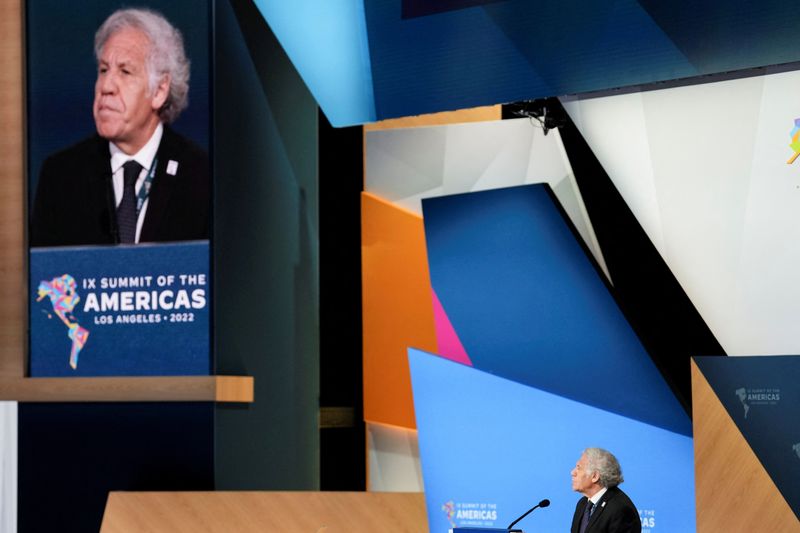By Matt Spetalnick
WASHINGTON (Reuters) -An independent probe has found that the head of the Organization of American States did not engage in serious misconduct in an intimate relationship with a staffer but that he violated its ethics code by failing to exercise "good judgment,” according to the results of an investigation seen by Reuters.
The findings of the probe, launched late last year following a whistleblower’s complaint against OAS Secretary General Luis Almagro, are laid out in a 121-page report distributed on a confidential basis to OAS member-states on Monday. It has not yet been made public.
The allegations against Almagro, who has long enjoyed U.S. backing, had raised questions about the future leadership of the OAS, the Western Hemisphere’s largest multilateral body. It was founded 75 years ago to promote regional cooperation but in recent years has struggled with ideological divisions among its 34 members.
The investigation, conducted for the OAS by the Washington law firm Miller & Chevalier Chartered, urged that the organization update and overhaul its ethics policies. The report stopped short of explicitly stating that Almagro was completely cleared of all the allegations he faced. It did not make any recommendations specific to him.
Still, Almagro’s critics in Latin America and other foes such as Russia could be emboldened to seek his ouster.
"The report exonerates me of all responsibility," Almagro, who had seen the findings, told Reuters in an emailed statement. "I accept and value especially the recommendations put forth."
The U.S., which had endorsed the launching of the ethics investigation, is likely to continue its support for Almagro, a former Uruguayan foreign minister who has headed the OAS since 2015.
He has mostly aligned himself with U.S. policy in recent years as an outspoken critic of Washington’s main regional rivals – Cuba, Venezuela and Nicaragua – which has alienated some on the Latin American left.
Frank Mora, U.S. ambassador to the OAS, said in statement that the report "appears to be thorough and fair" and he looks forward "to working collaboratively to implement the recommendations."
Almagro has also been criticized by Russia, especially after helping to push through a U.S.-backed OAS resolution last April suspending Moscow as a permanent observer to the Washington-based organization over the invasion of Ukraine.
The probe centered on what the report deemed was a consensual relationship between Almagro and a Mexican-born woman. Their romance, which began in mid-2018, became common knowledge inside the OAS and the couple made no effort to hide it, according to the report.
OAS guidelines say intimate relationships are allowed unless they interfere with performance of duties or disadvantage other staffers. It also dictates that managers must not take part in "supervising or evaluating" their romantic partners.
MADE SOME STAFF FEEL UNCOMFORTABLE
Almagro went public with it at an OAS summit in Lima in October, insisting he had done nothing wrong and welcoming any investigation. The staffer, not named in the report, has been on unpaid leave since mid-2022 devoting her time to academic studies. The two broke up last year. Almagro is separated from his wife.
The probe determined that Almagro did not violate OAS rules on "staff supervision, salary decisions, intimidation, travel or conflict of interest" and exercised no "abuse of power" in connection with the staffer, according to a Spanish-language version of the report. It concluded her work was supervised by others and Almagro had no hand in her promotions or pay raises.
Investigators did find, however, that Almagro “violated the rules and regulations concerning provisions for common sense and good judgment” and contravened some “additional ethical responsibilities.”
But the investigators softened this conclusion by stating there was no evidence these breaches were "intentional," noting that he had consulted advisers on whether the relationship was a conflict of interest and was told it was not.
The report determined, however, that the relationship had made some of Almagro’s subordinates feel uncomfortable and chided him for failing to dispel the misperception she was a close adviser. It also said he committed an ethical "transgression" by allowing her to work in close quarters with him while they were romantically involved.
The OAS permanent council could convene later this week to discuss the matter.
Almagro won the top OAS post in 2015 in a near-unanimous vote. But reflecting the region’s growing political polarization, he was elected to a second five-year term in 2020 with the backing of only 23 member-states.

The Almagro investigation came shortly after the Inter-American Development Bank last year fired its president, Mauricio Claver-Carone, following an independent probe that found he favored a subordinate with whom he was alleged to have had an intimate relationship.
Unlike at the OAS, the IDB’s ethics code prohibits such relationships.